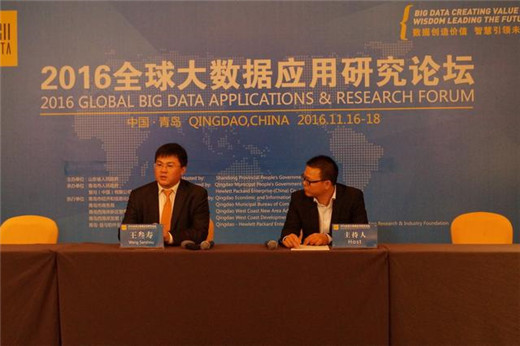Big data makes future cities more intelligent
( chinadaily.com.cn )
Updated: 2016-11-22
|
|||||||||
Big data will soon be reshaping our social interactions and our cities on a massive scale, said experts at the 2016 Global Big Data Applications & Research Forum in Qingdao, Shandong province on Nov 17.
The application of big data technology will exert a big influence on the course of Chinese cities' modernization. More and more local governments across China are promoting smart city technology in order to rationalize the allocation of social resources and utilize urban resources more efficiently to better serve residents.
The advancements of information technology in recent years mean that urbanization today is qualitatively different to urbanization in the past. The development of the IT industry now has the power to shape the world economy and society, and the level of development of a country's IT industry has already become a symbol of its strength as an economy and as a measure of its modernity as a society.
Transform government data into an asset
The attendees from Guizhou province caught the eye at the forum, as the province started early in its promotion of big data and has provided its rapidly developing industry with enormous government backing.
What's big data's significance in stimulating local economic development and promoting industrial upgrading?
According to Wang Sanshou, executive president of Guiyang Big Data Exchange, big data is closely related with all aspects of the society, from politics, economics and businesses to daily life, culture and education.
But the big data industry still has a chronic lack of data cleaning or data scrubbing bases to detect and correct corrupt or inaccurate records from data sets.
"Data cleaning is absolutely crucial to the big data industry. If Qingdao can dominate the data cleaning business, then related industries will soon relocate to the city. Qingdao must grasp the great opportunity to develop its big data industry," Wang said in an interview after the opening ceremony of the 2016 Global Big Data Applications & Research Forum on Nov 17.
 |
|
Wang Sanshou, executive president of Guiyang Big Data Exchange, delivers a speech at the 2016 Global Big Data Applications & Research Forum. [Photo/toutiao.com] |
Wang added that big data can be divided into smaller units, including government data, financial data, Internet data and industrial data, while government data accounts for about 70 percent of all data. In this respect, China should grab the market share as soon as possible.
"Public events influence people's lives greatly. But now we can use big data technology to enhance government's crisis intervention and management ability," said Zhang Chuncheng, general manager of a technology company based in Guizhou.
The company has established an Internet of things (IoT) sharing platform for the local government. Through the real-time acquisition and processing of public security-related information, the platform sends early warning signals to relevant government authorities that emergency measures may be necessary, which helps to improve the area's public security system and the government's efficiency, as well as safeguarding people's lives and health.
However, Zhang added that information sharing would be a major challenge for government departments due to policy barriers and national security concerns. On this point, certain government department can establish internal information sharing platform to improve their efficiency.
"Through our big data technology, government data becomes a useful asset, promoting better governance and providing an impetus for the progress of industrial technology," Zhang said.




